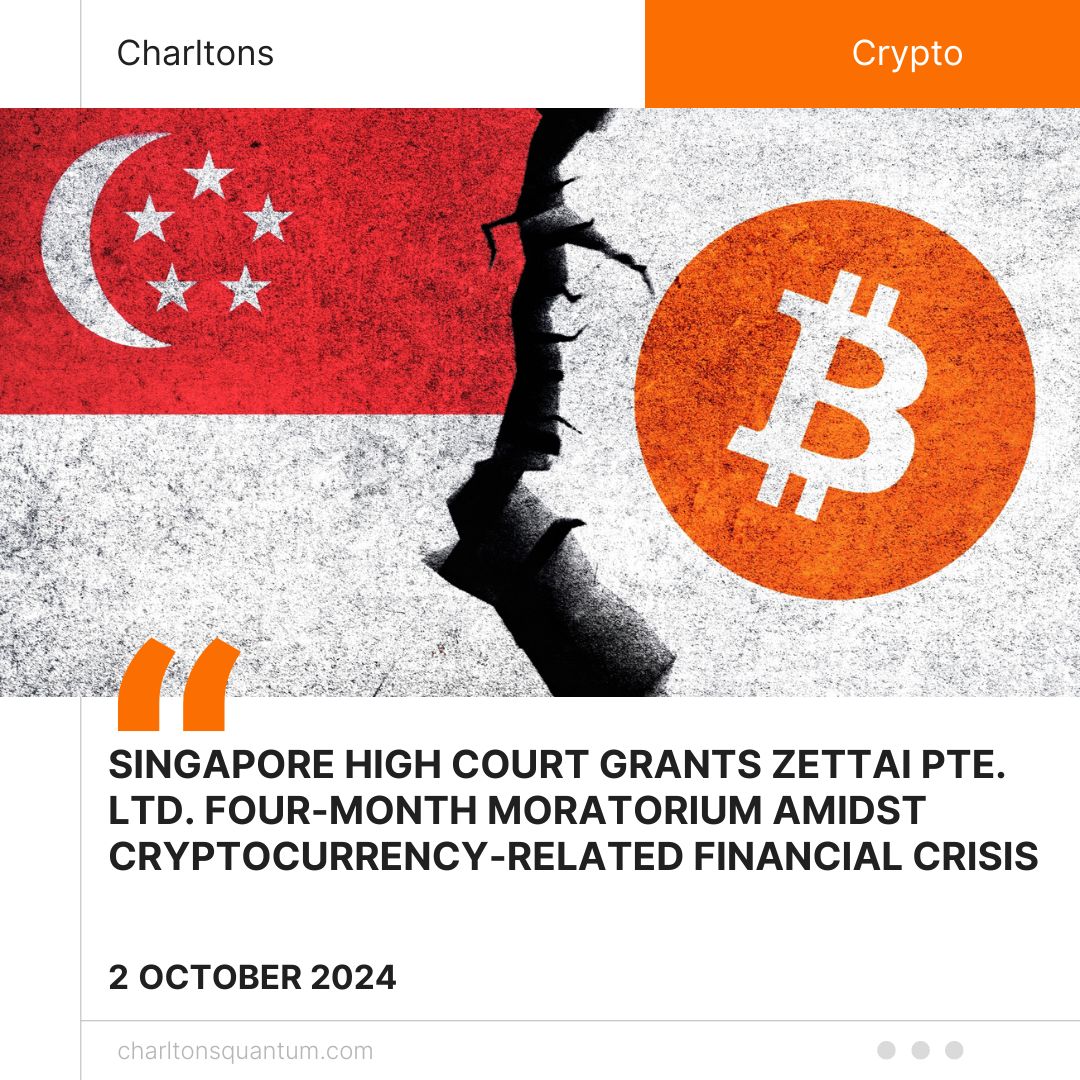
On 27 September 2024, the High Court of the Republic of Singapore issued an order in the ongoing case of Zettai Pte. Ltd., a company undergoing restructuring amidst significant financial and operational challenges. This order, granted under Section 64 of the Singapore’s Insolvency, Restructuring and Dissolution Act 2018 (SG IRDA), offers a four-month moratorium to Zettai Pte. Ltd., which effectively protects the company from any legal actions, including winding-up resolutions and other judicial proceedings initiated by creditors or stakeholders. The Honourable Judicial Commissioner Kristy Tan presided over the case, issuing a comprehensive ruling aimed at stabilizing the company while restructuring efforts are underway.
Zettai Pte. Ltd., a Singapore-based entity, found itself in a difficult position due to operational difficulties that arose when several of its cryptocurrency wallets were compromised by hackers, leading to asset losses amounting in hundreds of millions. In response to these challenges, Zettai sought protection under Singapore’s IRDA, requesting a moratorium to shield itself from creditor actions while it devised a viable restructuring plan. The company argued that it needed time and space to address its financial instability, restore operations, and negotiate with creditors without the immediate threat of liquidation or legal enforcement actions.
The court’s decision to grant the moratorium is a critical part of this restructuring process. It is designed to provide temporary relief to Zettai, enabling the company to continue operating while working to resolve its financial issues, including recovering from the hacking incident. The moratorium came into effect immediately and is set to last for four months, unless further extended by the court. The moratorium, issued under Section 64 of the IRDA, imposes the following restrictions and guidelines:
- The order bars prohibits creditors or stakeholders from initiating or continuing legal proceedings, execution processes, or winding-up resolutions against Zettai without first obtaining the court’s permission. This includes both local and international creditors who fall under the jurisdiction of the Singaporean courts.
- Creditors are prohibited from taking control of or seizing any assets belonging to Zettai during this period. This prevents any forced liquidation of assets, providing the company the time to reorganize and potentially recover assets lost in the hacking incident.
- While creditors are restrained from taking legal action, the company is allowed to pursue its own claims. Notably, Zettai retains the right to pursue any legal action or counterclaim related to proceedings initiated before 23 August 2024. This clause enables Zettai to continue its efforts in recovering assets and possibly seeking legal redress for the hacking incident.
- As part of the court’s conditions, Zettai is mandated to file affidavits that disclose crucial information about its cryptocurrency wallets, the specific wallets that were hacked, the current location of user assets, and any ongoing recovery efforts. This is aimed at ensuring transparency for both the court and Zettai’s creditors.
- Zettai must provide up-to-date management accounts and other financial records to the court during the moratorium to ensure that the company’s financial status is closely monitored and that it remains accountable throughout the restructuring process.
- Any future applications to the court that require creditor input will involve electronic voting, which must be independently verified to ensure fairness.
- The Singapore High Court has ordered Zettai to determine the positions of its top 22 creditors in preparation for future proceedings. This will play a critical role in any restructuring or settlement plan that Zettai may propose.
For customers and creditors, the moratorium granted by the Singapore High Court suspends their ability to take immediate action against Zettai to recover their funds or assets. This means that individuals and institutions who are owed money by the company or whose assets were impacted by the hacking incident must wait until the moratorium expires or seek special permission from the court to initiate proceedings.
For customers, particularly those whose cryptocurrency assets were compromised, Zettai’s financial instability and the uncertainty surrounding the recovery of hacked assets make it unclear when or if full restitution will be possible. However, the court’s requirement that Zettai provides detailed disclosures about the hacked wallets and user assets aims to reassure customers that their interests are being monitored during the moratorium.
For creditors, the moratorium creates a temporary standstill on any attempts to enforce debts or seize assets. The Singapore High Court has put safeguards in place, including financial reporting requirements, to ensure that Zettai remains transparent throughout this period. Creditors will have an opportunity to participate in the restructuring process once the company presents a plan, and their positions will be taken into account during any future applications to the court.
While the four-month moratorium offers temporary relief, the company must provide detailed disclosures, work to recover lost assets, and develop a credible restructuring plan that satisfies both the court and its creditors. If successful, Zettai may transition out of the DSS and continue operations under a revised framework.





